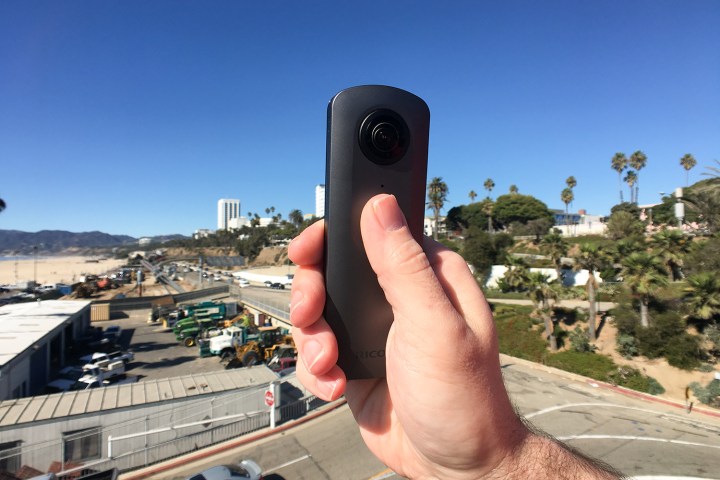
Ricoh’s flagship Theta V 360 camera now has expanded features beyond what even Ricoh can imagine. After launching the Ricoh Theta Plug-In Partner Program in June, the company launched the Plug-in Store on Monday, July 23. The program, which Ricoh first announced on January 8 at CES 2018, opens the Theta V to third-party developers to build expanded features that leverage the 360-degree camera. The store allows Theta users to expand the camera’s functionality using paid plug-ins.
The new program allows other companies to develop their own add-ons for the 360 camera by allowing access to the application program interface (API) and software development kit (SDK), which Ricoh rolled out in April. The kind of extra features the camera gains will depend on those developers, but as proofs of concept, Ricoh pre-installed two features it developed, when it launched the Theta V. One example is the plug-in that allows a smart device to control that 360 view when viewing footage on a standard TV screen, called Remote Playback. Another is USB Data Transfer, which lets users transfer content to a portable hard drive.
Because the Theta V has an open-architecture that is based on Android, developers don’t have to familiarize themselves with a new interface — especially if they are already developing Android apps — making it easier and faster to build these apps. These extra features are now downloadable using the Ricoh Theta V marketplace. When the platform opened, Ricoh added three new plug-ins it created: Wireless Live Streaming for YouTube; Automatic Face Blur that hides the faces of strangers in your photos and videos, to respect their privacy; and File Cloud Upload, which saves images to Google Photos.
“By opening the platform for application development, we are enabling the Ricoh Theta V to be a constantly evolving product. For this reason, we are very excited about the new partner program,” Wataru Ohtani, corporate associate vice president and general manager of Ricoh’s Smart Vision Business Group, said in a press release. “The Ricoh Theta V Plug-in Partner Program will enable third-party companies and developers to create custom features and services. Our goal is for consumers and businesses alike to benefit from Ricoh Theta V and to become a standard platform for the 360-degree imagery.”
At the launch, the new plug-in marketplace includes options from developers like Sony and Holobuilder. The first marketplace plug-ins add features like Google Cloud Storage with Fita, WebAPI access and industry-specific applications for construction and real estate.
Ricoh was one of the first companies to launch a consumer 360 camera in 2013, but the Theta V brings 4K and surround-sound compatibility to the line as well as low-energy Bluetooth. Using a similar design that’s shaped more like a TV remote than a camera, the V added advanced features to the line and enhanced the image quality over the company’s less expensive options such as the Theta SC. The Theta V is the first 360 camera that uses the Qualcomm Snapdragon processor, a feature that Ricoh said at the launch would open up possibilities for third-party apps along with options directly from Ricoh. With today’s launch, that capability is now available for developers.
Read our full review of the Theta V.
Updated on July 25: Added the official launch of the Ricoh Theta V Marketplace.


